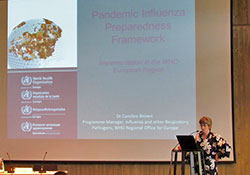Collaborative and successful PIP Framework implementation presented at ECDC influenza surveillance meeting

WHO Collaborating Centre for Reference and Research on Influenza at the Francis Crick Institute
The Pandemic Influenza Preparedness (PIP) Framework was presented at the annual European Centre for Disease Prevention and Control (ECDC) influenza surveillance meeting held in June 2015 in Stockholm, Sweden. Participants were influenza experts from the 31 European Union (EU)/European Economic Area Member States, as well as participants from 7 EU enlargement countries, 2 current and/or former members of the PIP Advisory Group and staff from WHO/Europe.
The meeting informed experts from 41 of 50 countries of the WHO European Region influenza surveillance network about the PIP Framework and the achievements of the first year of implementation of the PIP Partnership Contribution (PC) Implementation Plan. The PIP Framework PC supports the enhancement of influenza surveillance in Europe such as publication of the joint ECDC-WHO/Europe weekly influenza surveillance bulletin, Flu News Europe, based on reporting of epidemiological and virological influenza surveillance data by 48 countries throughout the influenza season.
In addition to intercountry activities, PIP Framework PC currently provides direct support for 5 countries in the Region: Armenia, Kyrgyzstan, Tajikistan, Turkmenistan and Uzbekistan.
Key achievements in the first 12 months of PIP Framework PC implementation included in-depth assessments of laboratory, surveillance and outbreak response capacities in 4 countries resulting in:
- revision of influenza surveillance guidelines and incorporation of sentinel influenza surveillance in hospitals;
- case record reviews and feasibility studies in sentinel sites for hospital surveillance;
- development of national operational outbreak investigation and response guidelines by national working groups; and
- 130 intensive care unit clinicians trained in the care of patients with severe disease due to influenza (critical care of patients with severe acute respiratory infections).
Results also occurred in capacity building in influenza virological surveillance and laboratory quality.
- 60 certified shippers of infectious substances in 3 PIP eligible countries strengthened their ability to share influenza viruses with human pandemic potential with WHO.
- Influenza laboratory experts from 20 countries were trained in the Laboratory Quality Management System Training Toolkit and the Laboratory Quality Stepwise Implementation tool.
- Laboratory experts from 13 countries were trained in principles of polymerase chain reaction assays' development and validation.
- 17 virologists from 14 countries were trained in laboratory preparedness for emerging respiratory pathogens.



